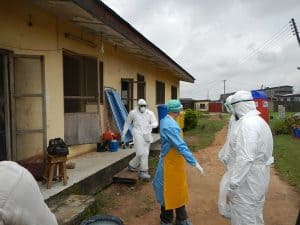Wellcome Trust makes Ebola research investment
pharmafile | August 21, 2014 | News story | Research and Development, Sales and Marketing | Africa, Ebola, Nigeria, deltas, welcome trust
The Wellcome Trust is launching a new multimillion pound initiative for emergency Ebola research coupled with a £40 million investment for longer-term medical research in Africa.
This comes a week after the World Health Organization said it will allow untested treatments for Ebola to be used in West Africa, as the death toll from the virus passes the 1,000 mark.
The emergency Ebola initiative from the Trust, which includes contributions from partner funders, will support research that can quickly begin to investigate new approaches to treating, preventing and containing the disease during the current epidemic in West Africa.
It will also support research into the ethical challenges of testing experimental medicines during epidemics, it says in a statement.
Its goals are to identify clinical and public health interventions, including drugs and vaccines, with the potential to contribute to tackling the present crisis in Liberia, Sierra Leone, Guinea and Nigeria, and to inform the way in which future epidemics of Ebola and other infectious diseases are handled.
As well as funding emergency Ebola research, the Wellcome Trust which is the world’s second-highest-spending charitable foundation, is making a further long-term commitment to African health through a £40 million programme of support for excellence in African research.
The investment, which it says marks a ‘step change’ in the Trust’s activity in Africa, will help the continent to develop a world-class medical research base so it is better equipped to investigate and tackle its greatest health challenges.
Dr Jeremy Farrar, director of the Wellcome Trust, says: “The Wellcome Trust is investing today in a package of research that can make a difference to Africa in the short, the medium and the long term. Measures to contain, treat and prevent diseases such as Ebola can be evaluated only in the context of epidemics like this one, which is why support for research is needed immediately. We are grateful to the partners who have helped us to launch these initiatives so quickly.
“The gravity of the Ebola epidemic in West Africa demands an urgent response, and we believe rapid research into humanitarian interventions and therapeutics can have an impact on treatment and containment during the present outbreak. What we learn could also change the way we approach future outbreaks, providing us with tested tools and techniques that were not available to public health authorities this time.”
Farrar adds that in the long run, he wants African countries to be better best placed to address emerging and endemic infections, established threats such as HIV, TB and malaria, and the growing problem of non-communicable diseases such as diabetes, cancer, stroke and mental health.
This can only be done, he says, if the continent has an ‘outstanding research base’ able to respond to Africa’s needs. “We believe that the DELTAS Africa programme can support Africa to build better health through world-class research,” he concludes.
Ben Adams
Related Content

Fosun Pharma and IFC partner to improve access to medicines in Africa
Shanghai Fosun Pharmaceutical Group has announced a partnership with the International Finance Corporation (IFC) with …

FDA approves Regeneron’s antibody Ebola treatment
The FDA has approved Regeneron’s antibody drug inmazeb for treating Ebola. The treatment works through …

European Commission announces approval for Janssen’s Ebola vaccine
Johnson & Johnson announced that the European Commission has granted Marketing Authorisation for its Janssen …








